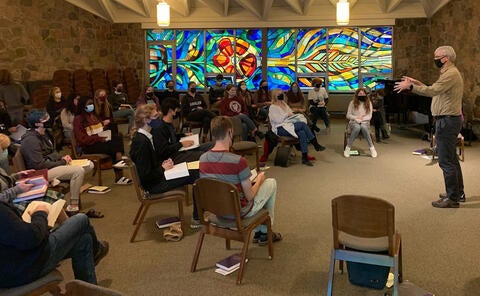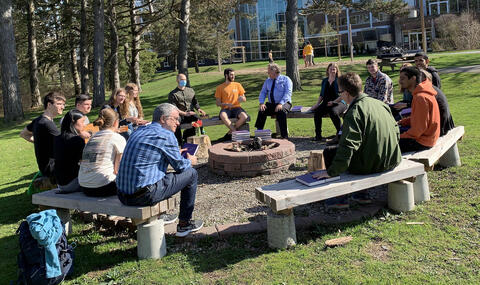 As part of Grebel’s mission to nurture faith in service to church and society, the College has woven many threads of opportunity into its programming. While Grebel students are on diverse career paths, those who want to build church leadership skills find ways to develop those gifts.
As part of Grebel’s mission to nurture faith in service to church and society, the College has woven many threads of opportunity into its programming. While Grebel students are on diverse career paths, those who want to build church leadership skills find ways to develop those gifts.
Professor Derek Suderman was a guest speaker at a Wednesday Chapel. Every service is planned by the Chapel Team.
SUPERVISED EXPERIENCE IN MINISTRY
Grebel’s Master of Theological Studies (MTS) program often attracts students who want to explore vocations of ministry and service or who want to learn how to be more effective leaders in the church. One way students learn practical church leadership skills outside the classroom is through the Supervised Experience in Ministry (SEM) course, which offers them ten hours of hands-on training a week.
 “In a SEM placement, students consider what type of ministry suits their skills,” explained Professor Carol Penner, Director of the MTS program. “An SEM allows students to explore a calling. Often they don’t know if ministry is truly a good fit for their skills until they are actually doing the work. You can talk about church leadership in class, but actually being in a ministry setting is essential in the learning process.”
“In a SEM placement, students consider what type of ministry suits their skills,” explained Professor Carol Penner, Director of the MTS program. “An SEM allows students to explore a calling. Often they don’t know if ministry is truly a good fit for their skills until they are actually doing the work. You can talk about church leadership in class, but actually being in a ministry setting is essential in the learning process.”
Graduating MTS student Susan Fish has seized the opportunity to try two different Supervised Experience in Ministry placements during her studies: one at Crieff Hills Community Retreat Centre and the other at Credence and Co.. “I don’t imagine myself in formal church leadership,” Susan reflected. “I’ve been delighted to have leadership in the church broadened to include opportunities to work in contexts that support the church. In one position, part of my role was to understand the needs of clergy during COVID-19 and how a retreat centre might support those needs, while in my second role, I learned a lot about assessing congregational dynamics.”
“In both cases,” she added, “what I’ve found most helpful has been the opportunity to test out a role I think would be of interest to me after graduation, and for them to test me out before hiring. I’ve also appreciated that this has involved a reading and supervision/mentoring dimension that has really helped me integrate what I am doing and learning.” In fact, both of Susan’s placements did lead to job offers after graduation.
Josh Martin, who is also graduating with an MTS degree this year, explored a call to ministry through SEM placements at two different churches. Working at Listowel Community Church and then Rockway Mennonite Church, Josh described his role as sharing in the church’s pastoral work, in a small capacity, of preaching, leading worship and Bible studies, developing Bible study resources, and participating in pastoral visits.
 “I think the most valuable aspect of both of my SEMs was the mentorship I received from my placement supervisors,” Josh shared. “Both of the pastors I had the privilege of working with were wise, personable, interested in my growth, and honest about the joys and difficulties of pastoral ministry. While the SEM experience was tremendously valuable to me in a variety of ways, I cannot overstate the importance of these relationships and the opportunity they gave for questions and processing the various aspects of being a pastor.”
“I think the most valuable aspect of both of my SEMs was the mentorship I received from my placement supervisors,” Josh shared. “Both of the pastors I had the privilege of working with were wise, personable, interested in my growth, and honest about the joys and difficulties of pastoral ministry. While the SEM experience was tremendously valuable to me in a variety of ways, I cannot overstate the importance of these relationships and the opportunity they gave for questions and processing the various aspects of being a pastor.”
“Working one-on-one with a mentor is one of the great advantages of an SEM,” explained Carol. “Students learn from the wisdom of a mentor, and the mentor sees the ministry setting through the fresh new eyes of the student. It’s a win-win situation.”
Josh found that his placements shed light on areas and aspects of ministry that he hadn’t considered and also highlighted areas in which he could grow in order to become an effective leader. “I think one of the shortcomings of church leadership is that so often people find themselves very alone,” he added. “My SEM experiences gave me a strong sense of not being alone, and in the case of my particular supervisors, a welcome invitation to stay in touch. We all need friends and colleagues in ministry.”
Many people who complete an MTS degree at Grebel go on to church leadership positions, either informally or as a career.
MINISTRY INQUIRY PROGRAM
In partnership with Mennonite Church Eastern Canada, Grebel’s Ministry Inquiry Program (MIP) provides undergraduate students with a firsthand opportunity to experience the unique roles that pastors play in their church communities. “So much of the work pastors do is behind the scenes and when students participate in the MIP, they may discover a passion for some of the tasks of ministry that go beyond preaching and worship leading,” explained Jessica Reesor Rempel (BA 2011), Interim Chaplain.
“When I was a Grebel student,” she reflected, “I had the opportunity to participate in a MIP, and for me, it was a crucial link in seeing the ways in which my interest in peace and justice work combined with church work. The opportunity to explore my gifts and be mentored in such an intentional way helped to set the foundation for my later call to ministry.”
Over the years, many Ministry Inquiry participants have similarly gone on to ordained ministry in the Mennonite Church, while others have used the gifts they honed in MIP to participate actively in their own congregations in volunteer roles. “More than ever,” added Jessica, “the church of the future will need skilled volunteers as well as professional pastors, and I believe it is important to continue inviting students who are passionate about church to participate in this program, whether or not they see the possibility of professional ministry in their future.”
CHAPEL TEAM
Another way that Grebel undergraduates practice church leadership skills is by participating in the Chapel Team. This group of students meets weekly to plan and implement the theme, scriptures, participants, and musical aspects of the College’s Wednesday Chapel services.
 “Being on the Chapel Team allowed me to take part in different ways to worship God,” shared second-year Peace and Conflict Studies student Merveille Mwankin. “As a team, we were able to think creatively on how to run the weekly Chapel services. Our God is a creative God and he desires for us to use our creative mind he has gifted us with to glorify him. This was demonstrated through music, instruments, reflections, prayers, and worshiping him by admiring God’s creation through outdoor services.”
“Being on the Chapel Team allowed me to take part in different ways to worship God,” shared second-year Peace and Conflict Studies student Merveille Mwankin. “As a team, we were able to think creatively on how to run the weekly Chapel services. Our God is a creative God and he desires for us to use our creative mind he has gifted us with to glorify him. This was demonstrated through music, instruments, reflections, prayers, and worshiping him by admiring God’s creation through outdoor services.”
“There is something very Anabaptist about gathering together to discern where God is leading us in worship as a Grebel community,” explained Jessica. “Students who participate in Chapel Team are gaining behind the scenes worship-planning skills and also the more public skills for worship, such as reading scripture well, song leading, and even preaching. Many of the students who participate in Chapel Committee have already been active members in their home church communities, and our hope is that they will take these new skills back to their home churches.”

“I do think I’ll bring some of the skills I’ve practiced in worship planning and leading to my home church of Hagerman Mennonite,” added Merveille. “I’m envisioning a church that equips every member to discover, grow, and apply their God-given gifts and talents to find their role in ministry.”
An outdoor Chapel Service, led by Intermin Chaplain Jessica Ressor Rempel and the Chapel Team.
WORSHIP APPRENTICES
Grebel offers a minor, a diploma, and a specialization in Church Music and Worship. Students in those programs may choose to participate in the recently developed Worship Apprentice Program. In this program, they gain practical experience in developing, refining, and leading an interdenominational church worship service, and then deliver it in person to several different churches.
“This program directly addresses Grebel’s mission to serve the church by developing worship leaders for the next generation,” explained Professor Kate Kennedy Steiner, Director of Church Music and Worship. “We know that worship leaders and music leaders are often volunteers or are trained in other areas, but don’t have the opportunity to actually practice and reflect on their practice when they fill these really important roles in churches.” She continued, “The Worship Apprentice Program allows students to engage and learn from practices that are less familiar to them, and I think that also serves the church broadly because it builds bridges across traditions.”
Almost all of Grebel’s past Worship Apprentice participants are now formally or informally leading worship or resourcing churches regularly in the Mennonite Church or in the contexts they came from. Kate noted, for example, that one graduate is pursuing a master’s degree in liturgical music, another is leading a worship team, one is supporting a new church in Turkey, and another is working with Mennonite Church Eastern Canada. “Every one of them learned something about themselves as leaders and brings back to their own contexts a deeper understanding of worship and the church worldwide.”






